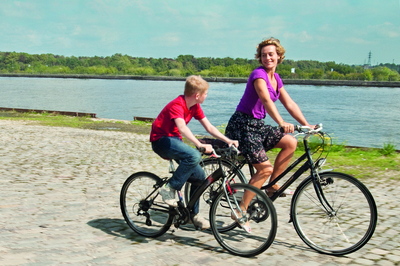Fable Verite, by David Bax
Brothers Jean-Pierre and Luc Dardenne have been making films together since the late 1970’s but it’s really over the past fifteen years or so that they’ve become the most potent working example of auteur theory today. Still, their signature style isn’t simply a calling card. Their long takes in which a handheld camera follows the protagonist from a rigidly fixed distance, usually something approaching a close-up, are put to powerful effect, given the kinds of stories they tell. These are tales of Belgians of meager means, who often embody a conflict between good impulses and bad ones. The Dardennes are convinced, though, that if they look at them for long enough and with enough focus, they’ll find the humanity in them. Their newest film, The Kid with a Bike, may not live up to the standards of earlier works like Rosetta and The Son but it fits the Dardenne mold perfectly.
This time around, the subject of the directors’ firm but gentle gaze is Cyril (Thomas Doret), a twelve-year-old boy living in a sort of foster care institution. He was put there by his father with the understanding that they would be reunited as soon as the man got his affairs and finances in order. The film begins with Cyril angrily coming to the realization – though he wouldn’t admit it out loud – that he has been abandoned. His father has no plans to come back for him, evidenced by the fact the he has moved from his apartment and offered no forwarding address. Apparently, his last act before departing was to sell his son’s only cherished possession, a bike.
Soon after, however, a woman named Samantah (Cécile de France) from the same housing project Cyril’s dad just left buys the bike from the boy to whom it was sold and returns it to Cyril. At the boy’s suggestion, she eventually agrees to take him home on weekends. The majority of the film concerns these weekends and Cyril’s twin influences; the kindly Samantha on one side and the project’s young and burgeoning criminal element on the other.
Stylistically, there may not be many flourishes to the Dardennes’ work but it would be wrong to label their films “simple.” By training their camera so precisely on their characters’ faces, they allow you to see much more than you could at a distance. It’s like putting your eye to a keyhole to find a sprawling landscape on the other side.
Such a close inspection on the elements of the people and their world forces naturalism from the actors. Even mild artificiality would be magnified tenfold at this proximity. This is undoubtedly the filmmakers’ greatest strength but it also can be a cause of danger. The realism with which everything is presented may obscure the more conventional aspects of the story. While the aforementioned Rosetta actually manages to feel like a documentary at many times, this film contains too many of the convenient coincidences that define cinematic duplicity.
As a result, the actual troubles likely to be encountered by – and inherent in – a boy in Cyril’s position are oversimplified or ignored outright. Growing up as traumatically as he has could make him cold and possibly even violent. Granted, he does display these traits in flashes but they are too easily overcome and not deeply enough rooted to be fully believable. Furthermore, even if it is possible for a boy in Cyril’s position to be taken home for weekends by a stranger, the chances of his finding one as kind and understanding as Samantha are slim.
Honestly, however, given the film’s actual thematic thrust, these are minor concerns. The Dardennes are telling us a fable whose ultimate lesson is that the “goodness” of a person is never readily apparent. For example, anyone who met Cyril’s father would, at least initially, find him to be a pleasant and gentle man with an easygoing nature. Similarly, a couple of characters who are upstanding citizens living outside the projects, whom we’ve been conditioned to sympathize with as victims of crime, reveal themselves to be petty and selfish. Yet it is the brash and impulsive – but big-hearted and wounded – Cyril who is treated with some of the most suspicion and disdain.
With its conclusion, this film may be slightly too simple, pat and forgiving for a film that tries to engage so frankly with reality. But the Dardennes have always been true humanists, finding the good in criminals and fuck-ups and outsiders. The Kid with a Bike is undoubtedly a part of that tradition.



























